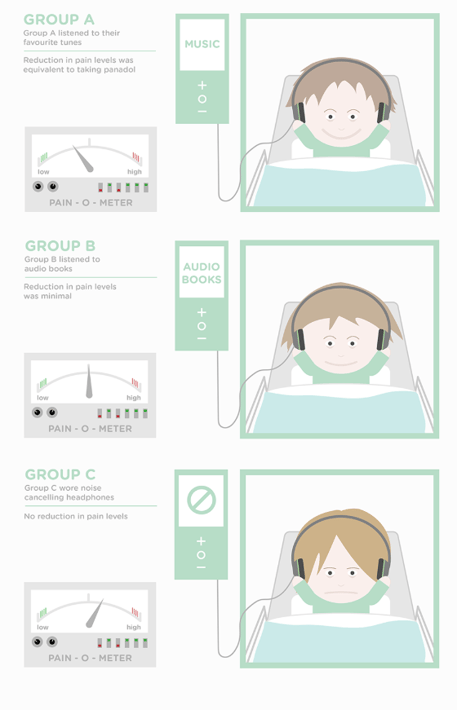Music is the Drug of Choice

Every day we come across new evidence-based reasons to integrate music into our lives. At Feed.fm we’ve spent much of this year working closely with fitness companies to help them improve workouts with music. There is a great body (pun intended!) of work that illustrates the many ways music positively impacts physical exertion, a few key points here. Much of this work is focused on athletes and healthy adults, but what about music’s impact on healing? Musical interventions can play a huge role in health care, from operation rooms to rehab centers to in-home recovery scenarios.
There is so much incredible science emerging around the positive impact of music on ailments and healing, so we decided to narrow it down to our top 5 favorites for now.
1) Music is better than drugs in reducing anxiety before surgeryIn over 15 studies, researchers were able to prove a drop in cortisol (stress hormone) after listening to relaxing music. One study even compared patients who listened to music directly with patients who took a Valium. Believe it or not, music wins!
2) Music listening aids in stroke recovery
Music enhances alertness and directly stimulates damaged areas of the brain after a stroke. This study found that verbal memory and focused attention recovered significantly better in patients that listened to music; and they had a more positive mood to boot. Incredibly, 3 months after the stroke, verbal memory improved from the first week post-stroke by 60 percent in music listeners, by 18 percent in audio book listeners and by 29 percent in non-listeners.
3) Music reduces post op surgery pain for children
A study in 2015 found that music offered a pain reduction equivalent to taking panadol.

4) Music improves sleep disorders
The scary side effects of Ambien have been well documented - from food binging to sleep walking and worse. Knowing that, I’ll take a solution with zero side effects any day. Music is proven to assist in improving sleep quality of patients with acute and chronic sleep disorders. With estimates of prevalence of sleep disorders in adults ranging from 30-40%, it seems high time to spread the word about this free, effective tool.
5) Music boosts your immune system
Listening to music increases your production of immunoglobulin A and natural killer cells. Combine that with a reduction in the stress hormone cortisol and there is massive support for the power of vibration and rhythm to impact our health positively.
Humans have a long history of using music to heal. In fact, The United States Indian Bureau contains 1,500 songs used for healing purposes by Native Americans. As is often the case these days, science is bringing us back around to approaches we’ve intuitively known for centuries. We’re excited to continue to see this field develop and to help our partners find new ways to leverage music for health and wellness.
Image Credit: hhhhappy.com

 2 min
2 min